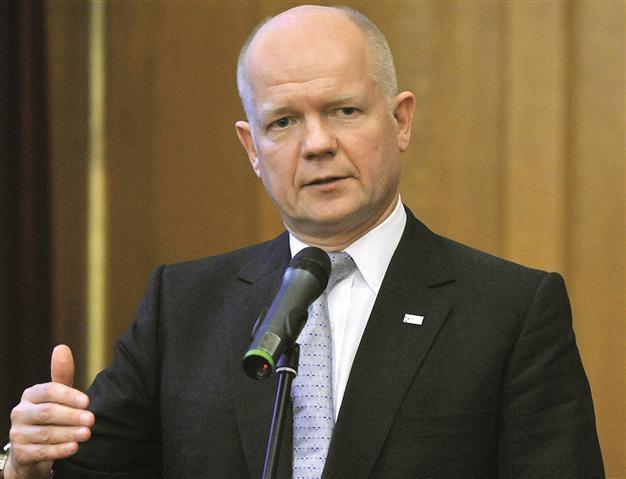EU becomes juggernaut, says Britain
BERLIN

Brits see the EU as something that they have no say over, Hague says. EPA Photo
Britain has called the European Union a “great machine that sucks up decision-making from national parliaments,” as the continent tackles its debt crisis, the latest sign of the growing divide between the U.K. and the bloc.
U.K. Foreign Secretary William Hague told a foreign policy forum in Berlin that the push for ever-greater coordination in areas like the banking sector and national budgets to fight the euro debt crisis risked driving a wedge through the EU.
“The coalition government is committed to Britain playing a leading role in the EU but I must also be frank: public disillusionment with the EU in our country is the deepest it has ever been,” Hague said.
“People feel that in too many ways the EU is something that is done to them, not something over which they have a say... People feel that the EU is a one-way process, a great machine that sucks up decision-making from national parliaments to the European level until everything is decided at that level.” He added, “These points may be felt most acutely in Britain, but they’re not felt only in Britain.”
These criticisms of the EU are some of the strongest to be voiced by a British government minister in recent months.
They are likely to strain the already frayed ties between Britain and the EU’s power brokers, with Germany increasingly irritated by the detached instincts of British Prime Minister David Cameron and the bulk of his Conservative lawmakers.
As Europe faces a growing gulf between the 17 countries of the eurozone and the remaining 10 EU member states, German Foreign Minister Guido Westerwelle insisted all 27 states, including Britain, should push for a sustainable end to the euro crisis.
“All Europeans, and not just those in the eurozone, share an interest in a strong Europe and a healthy euro,” Westerwelle said.
Westerwelle warned Hague that while the EU welcomed dissenting views, the integration process could not wait for doubters.
“All are welcome to contribute their ideas. But if anyone does not want to come along or cannot come along, it will not prevent the rest from going on ahead,” said Westerwelle.
“That goes for travel freedom in the Schengen Zone, that goes for the common currency and I believe it also goes for common foreign and security policy,” he said.
Speaking at the same conference, Finland’s Europe Minister Alexander Stubb said, “William, please, join the banking union, don’t sit on the fence – we need you.”
The reply was totally unambiguous.
“To join in a banking union with another currency – the currency of our friends, but another currency - would be an extremely difficult thing to do. That is why we will not be part of the banking union,” Hague said.
In a later debate, Westerwelle appealed to London not to drift away from Europe.
“We want to have Great Britain on board,” he said. “We think Great Britain is not an island in the middle of the Atlantic; it is a European country, there is no doubt for us.”
This was not the first incident illustrating the deepening rift between the U.K. and the EU.
At an EU summit last week, British Prime Minister David Cameron threatened to veto the EU’s 2014-20 budget if it included increases in spending at a time when member state budgets are being cut. On Oct. 22 Germany denied reports that it would seek to have a future EU summit on the bloc’s seven-year budget scrapped if Britain threatened to veto a deal.
Compiled from AFP, AP and Reuters stories by the Daily News staff.
